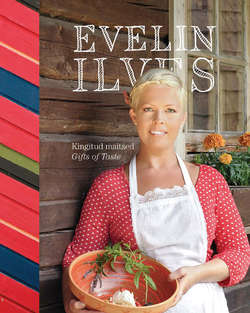Читать книгу Kingitud maitsed - Evelin Ilves - Страница 7
На сайте Литреса книга снята с продажи.
Foreword
ОглавлениеDe gustibus non est disputandum or there is no disputing matters of taste is a maxim from Roman times we know in all our own languages in Europe, such is its universality and its understated affirmation of tolerance. Individuals see and experience the world differently. Our tastes are determined by our culture and our climate, what surrounds and nourishes us and by our upbringing. As adults in a modern world, however, we discover new worlds, new ways of tasting, of seeing our surroundings. Not that there was anything wrong with what we encountered as children, but rather that we discover that the world is far richer and more varied than we understood as six- or seven-year-olds.
This is not only true of literature, art and music as the Latin adage is generally applied but also quite literally when it comes to taste.
Humans, like all living beings, need nourishment to live. Living beings, be they plants or animals have certain basic requirements, reducible to two dozen amino acids, without which they die. Culture however, means that survival is not enough. Humans, as they developed as social beings, applied their creative energies to create music, art, poetry and sports. They also applied their creativity to nourishment.
Thus, we Estonians and Finns have our unique form of poetry, regivärss, the trochaic tetrameter verse form better known in English as Kalevala verse, Western music its heptatonic scale while Indian music divides the scale into 11. So too have we our own tastes in food. Not better than anyone else’s, just different.
Nor is taste immutable. The tomato we associate with Italian food and the potato of central and eastern Europe were unknown in the Old World and were imported to our cuisines only in the last half millennium. What we consider home cooking, our national cuisine, can change in less than a generation: I recall reading a German soldier serving in Afghanistan answer the question what he missed most about not being at home: “a good dönner kebab”, a Turkish food unknown in Germany a mere 50 years ago. When a German soldier in Afghanistan feels Heimweh for dönner kebab, we see how much the world has changed and opened up.
As our world opens up, as we Estonians again live in liberty and travel wherever we wish, we find new tastes, new ways of experiencing, be it in literature, in music or nourishment. And new ways to be together. At home, our family has found cooking new and different meals and doing it together our most cherished time. With the ever increasing pace of life that comes with liberty, family time becomes more of a rarity, and hence more of a luxury. Cooking, we have found, is the best way to be actively together, with each of us helping to prepare some part of our dinner, lunch or breakfast, at least on the weekend, when we can all be home and break bread together. The recipes here in this book are recipes we use at home; they provide us with the variety and excitement of new and shared experiences.
The recipes here are the ones we have come to especially like, which may differ, of course, from what you enjoy. It’s all a matter of taste.
